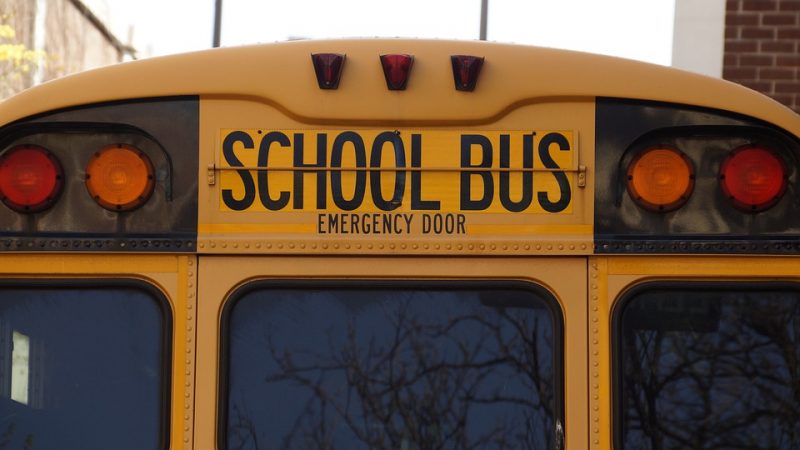latest
MA: Green means go to school; update on Senate race, DNC convention, mayor’s alleged contact

By Matt Murphy
Apologies to Pink Floyd, but experts agree kids do need some education. The nagging question is how best to provide it.
Learning is supposed to resume in a matter of weeks, but tension abounds between the state, districts, teachers’ unions, and parents about whether it’s safe to return to the classroom and whether remote learning is an acceptable substitute.
The state’s two major unions – the Massachusetts Teachers Association and the American Federation of Teachers – want school buildings to remain shuttered, at least to start the year. But Gov. Charlie Baker said he “can’t imagine” why most kids wouldn’t be returning to school given the current status of the virus in Massachusetts.
Gov. Charlie Baker looked up at a television screen displaying the state’s new color-coded COVID-19 infection rate map during a Tuesday news conference. [Sam Doran/SHNS]
After creeping up and ringing some alarm bells, the statewide positive test rate is back down around 1.5 percent, which is the lowest it’s been since widespread testing began.
Baker has preached local control throughout much of the pandemic, and rolled out a new rubric this week for people, including school administrators, to make decisions based on what’s happening in their own communities, not just across the state.
But he also made clear where he comes down on the question of remote versus in-person schooling. He’s had less to say about fall athletics, though his administration also warned this week that sports like football and basketball are inherently more risky than tennis.
The administration deployed another “stoplight” system to track each city and town’s progress in controlling COVID-19. The new color-coded maps of Massachusetts municipalities shade cities and towns “red,” “yellow,” or “green” based on the prevalence and spread of the coronavirus.
The colors correlate to average new daily cases reported over the previous two weeks, with “green” towns reporting fewer than four daily cases per 100,000 people, and “red” towns reporting more than eight new cases a day for every 100,000 people.
A fourth category – white – means a municipality has had fewer than five new cases reported in total over the past two weeks.
“If you’re in a green or a white community, I can’t imagine a good reason not to go back, whether it’s full-time or some sort of a hybrid, because for all intents and purposes you meet all the benchmarks that are being used across the country and across New England to make decisions about whether it’s safe to go back to school,” Baker said.
The governor said that unlike remote learning in the spring, the start of a new school year means students starting new grades with teachers they don’t know, and vice versa. Learning to read, he has said, is not a virtual exercise.
The Department of Elementary and Secondary Education formalized the governor’s position when it told the 305 green and yellow communities that the state expected them to prioritize in-person learning, though there’s no consequence for disobedience.
For 46 other communities, that is not their situation.
In these higher-risk communities, the state has put together an inter-agency task force to offer assistance with testing, contact tracing and enforcement of public and private gathering size limits.
The state said it will also help, if asked, with public awareness campaigns to remind people to stay focused.
“We’re making progress and have made progress in our fight, but we’re seeing the effects of too many people letting their guard down and simply relaxing, get in the way of some of our continued move forward,” Baker said.
Eleven municipalities have been put in the most at-risk “red” category, including Chelsea, Everett, Lynn, Revere, Fall River, Granby, Holyoke, Hull, Lawrence, Saugus and Salem. Those cities and towns, Education Commissioner Jeff Riley said, should begin the year with remote instruction.
Solving the school conundrum is not easy, but there was no controversy over what should happen with the Democratic National Convention next week, which was supposed to take place in Milwaukee before the pandemic.
The DNC will be fully remote. Not even Joe Biden, the presumptive Democratic nominee, will be there in person.
U.S. Sen. Elizabeth Warren scored a Wednesday night speaking role at the virtual DNC, but it was not the time slot many of her supporters may have been hoping to see. Biden this week announced California Sen. Kamala Harris as his running mate, making the daughter of Indian and Jamaican parents the first Black woman to run on a major party presidential ticket. She will give her acceptance speech on Wednesday night.
In picking Harris, Biden passed over Warren who was on the list of women the former vice president vetted for the job. But given the pressure on Biden to pick a woman of color, the outcome was not unexpected.
“I don’t worry about where she ends up or her influence on what happens during a Biden presidency. She’s already proven they work together well, and she’ll be a number one player wherever she is,” said Gus Bickford, chair of the Massachusetts Democratic Party.
Some have Warren ticketed for the Treasury if Biden can topple President Donald Trump in November, while others think she could be more powerful in the Senate, especially if Democrats can regain control of that body.
Regardless, there were probably more than a few eager Democrats who had to put their ambitions on ice, at least for now, as they wait to see whether a Senate seat opens up before 2024.
The competition for the state’s other Senate seat heated up, with U.S. Sen. Edward Markey and U.S. Rep. Joseph Kennedy III squaring off in their second-to-last debate before the Sept. 1 primary.
Polling has shown the race to be tight, and after refusing to sign a pledge to keep outside money out of their race, Markey is now hammering Kennedy over the support he is receiving from a new super PAC that may, or may not, be funded in part by Kennedy’s father, who himself was a congressman.
Markey has also benefited from super PAC spending, which Kennedy’s team is all too willing to point out.
Things may be getting uglier in the Senate race, but not as ugly as they got this week out west where UMass College Democrats accused Holyoke Mayor Alex Morse, who is gay, of inappropriately contacting students through social media channels. Morse denies taking advantage of his position as a UMass lecturer to meet men, but says he won’t apologize for using dating apps in his personal life.
Some LGBTQ lawmakers like Sen. Julian Cyr have come to Morse’s defense, suggesting a double standard in the face of unsubstantiated claims. Some reports have even suggested it may have been an orchestrated attempt to hurt Morse’s campaign against U.S. Rep. Richard Neal, who has denied any involvement.
The truth may be a bit blurred, but it’s clear it’s crunch time for a lot of campaigns as early voting is underway.
Dave Cavell, the one-time speechwriter in the Obama White House who advised Attorney General Maura Healey before leaving her office to run for Congress, saw his time running out.
Cavell suspended his campaign in the Fourth Congressional District, and endorsed Jesse Mermell. In doing so, Cavell not only talked up Mermell’s progressive credentials, but said he it was a strategic move to avoid further splintering the vote in what’s now an eight-person field in a way that could make it easier for Newton City Councilor Jake Auchincloss to win.
Auchincloss has become the crowded field’s favorite punching bag after the Boston Globe’s editorial board endorsed his campaign, despite some controversial comments he’s made in the past on social media.
For instance, his rivals view his free-speech comparison between the Confederate Flag and Black Lives Matter banners as disqualifying. He has since called those comments a mistake.
Cavell, however, was only the tip of the iceberg, because after he exited the race his former, and much better known, boss Healey also endorsed Mermell.
The attention on the campaign trail this week is what August is usually like in an even-numbered year, even though this is no usual year and the Legislature extended its session beyond the traditional July 31 recess date.
Legislative leaders suggested they would call lawmakers back into session this month if and when any of the conference committees negotiating policing, climate change, telehealth, economic development and transportation spending bills reached a deal.
So far, that hasn’t happened.
Also this past week:
The Maine Supreme Judicial Court ruled that Vacationland voters should not be able to decide the fate of a transmission line needed to bring Canadian hydropower from Quebec to Massachusetts.
Rep. Shawn Dooley, a Norfolk Republican, used Facebook as a platform to rail against “King Charles” and what he sees as the governor’s trampling of the Constitution through executive orders aimed at controlling COVID-19, namely the conditions placed on travelers visiting from places like Rhode Island.
Supreme Judicial Court Justice Barbara Lenk decided to postpone her planned retirement from August to December when she actually bumps up against the mandatory retirement age of 70, giving Baker more time to seek out qualified, and diverse, applicants for his sixth nomination to the top court.
-

 Community7 years ago
Community7 years agoNational Shrine of La Salette Festival of Lights 2017 set to begin
-

 Community6 years ago
Community6 years agoMassachusetts State Police looking for good home for retired dogs
-

 Crime6 years ago
Crime6 years agoFall River ranked most dangerous city in Massachusetts according to report
-

 latest7 years ago
latest7 years agoDurfee student allegedly overdoses on marijuana
-

 Community6 years ago
Community6 years agoVideo of Fall River Police goes viral
-

 Causes6 years ago
Causes6 years agoMissing Fall River woman found deceased
-

 Crime6 years ago
Crime6 years agoFall River Police add names to most wanted list
-

 Causes6 years ago
Causes6 years agoFall River teenager reported missing has been found




